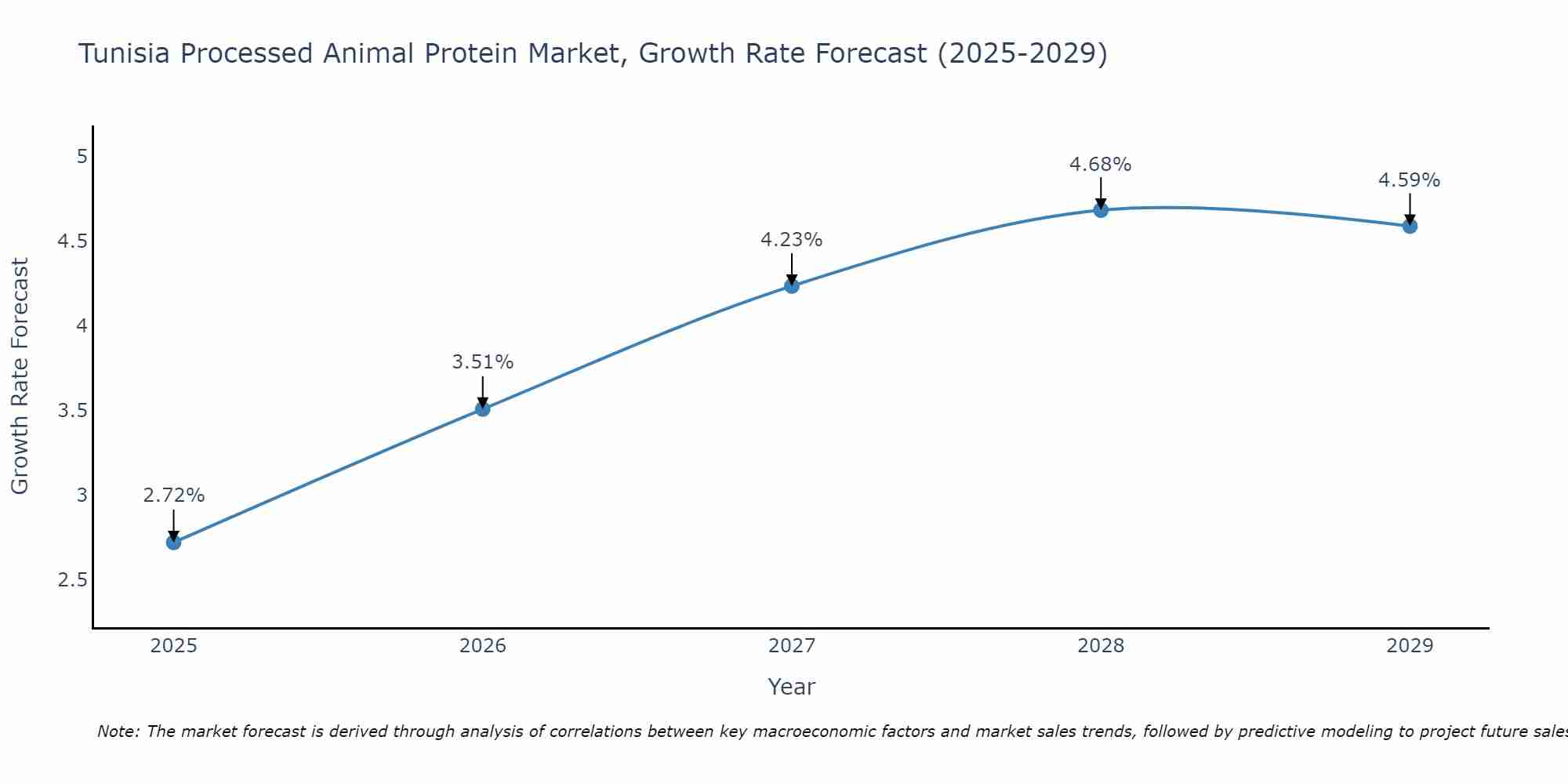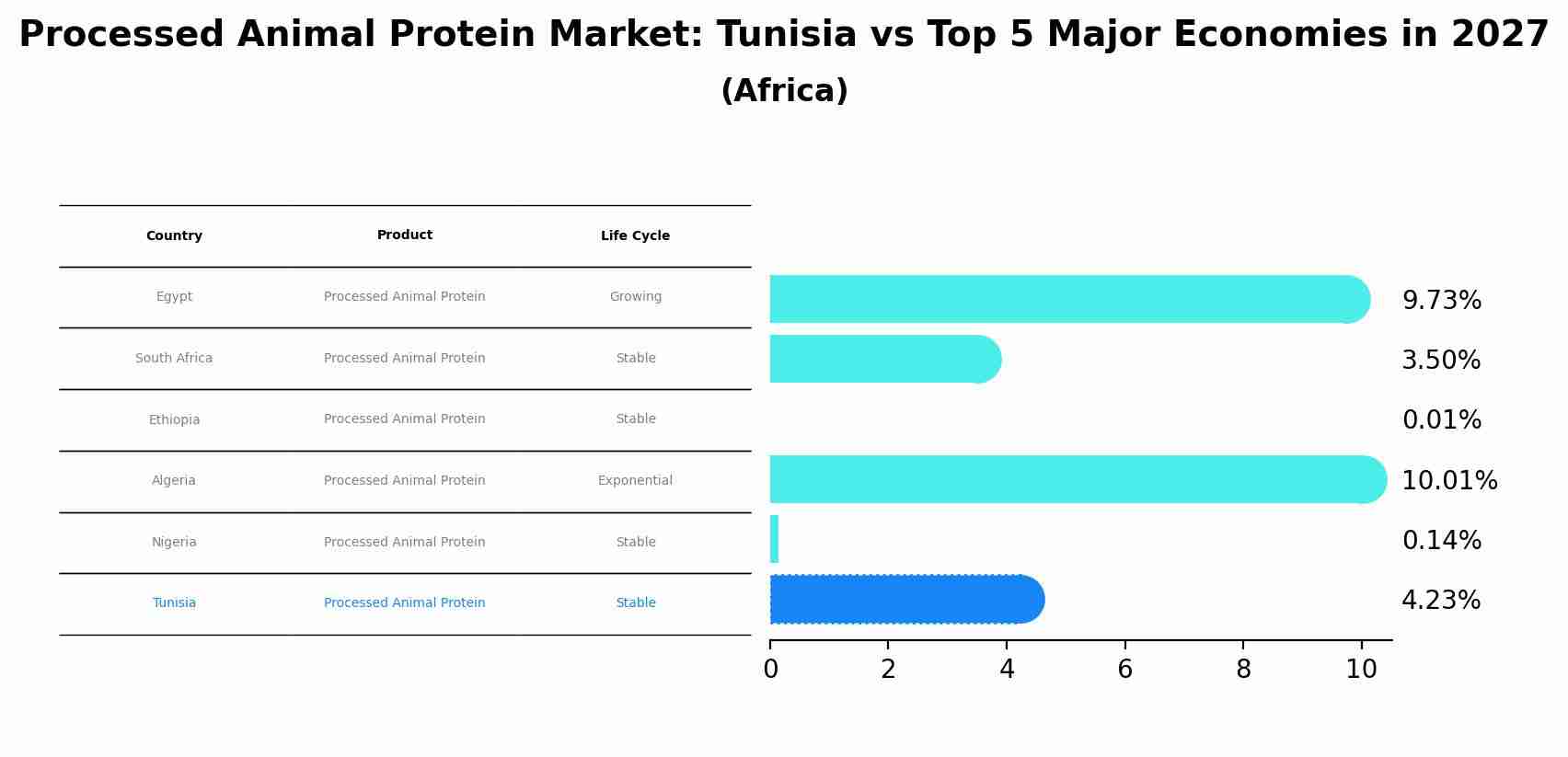Tunisia Processed Animal Protein Market (2025-2031) Outlook | Size, Companies, Industry, Forecast, Growth, Analysis, Share, Trends, Value & Revenue
| Product Code: ETC411950 | Publication Date: Oct 2022 | Updated Date: Jul 2025 | Product Type: Market Research Report | |
| Publisher: 6Wresearch | Author: Sumit Sagar | No. of Pages: 75 | No. of Figures: 35 | No. of Tables: 20 |
Tunisia Processed Animal Protein Market Size Growth Rate
The Tunisia Processed Animal Protein Market is projected to witness mixed growth rate patterns during 2025 to 2029. Starting at 2.72% in 2025, the market peaks at 4.68% in 2028, and settles at 4.59% by 2029.

Processed Animal Protein Market: Tunisia vs Top 5 Major Economies in 2027 (Africa)
By 2027, the Processed Animal Protein market in Tunisia is anticipated to reach a growth rate of 4.23%, as part of an increasingly competitive Africa region, where Egypt remains at the forefront, supported by South Africa, Ethiopia, Algeria and Nigeria, driving innovations and market adoption across sectors.

Tunisia Processed Animal Protein Market Synopsis
The Tunisia processed animal protein market is characterized by a growing demand for high-quality animal protein products such as meat, poultry, and dairy products. The market is driven by factors such as increasing consumer awareness about the nutritional benefits of animal protein, rising disposable incomes, and changing dietary preferences towards protein-rich foods. Key players in the market include local and international food processing companies, as well as retailers and distributors. However, challenges such as price fluctuations of raw materials, stringent regulations, and competition from alternative protein sources are impacting the market growth. Overall, the Tunisia processed animal protein market is expected to continue expanding as consumers seek convenient and nutritious protein options.
Tunisia Processed Animal Protein Market Trends
Currently, the Tunisia Processed Animal Protein Market is experiencing a growing demand for high-quality and sustainable protein sources. There is a noticeable shift towards healthier and more natural products, leading to an increased interest in organic and ethically sourced animal proteins. Consumers are also seeking convenience, driving the market for ready-to-eat processed animal protein products. Furthermore, with the rising awareness about the environmental impact of traditional animal farming, there is a growing preference for alternative protein sources such as plant-based proteins and insect proteins. Manufacturers in the market are adapting to these trends by introducing innovative products, improving sustainability practices, and enhancing transparency in their supply chains to meet the evolving consumer preferences.
Tunisia Processed Animal Protein Market Challenges
In the Tunisia Processed Animal Protein Market, some key challenges include fluctuations in raw material prices, limited availability of quality feed ingredients, and competition from imported products. The industry also faces regulatory challenges related to food safety standards and environmental sustainability. Additionally, the market is impacted by consumer preferences shifting towards plant-based protein alternatives, posing a threat to traditional animal protein products. Economic instability and political uncertainty in the region can further affect market dynamics and investment opportunities. To overcome these challenges, companies in the Tunisia Processed Animal Protein Market need to focus on innovation, product differentiation, and sustainable practices to remain competitive and meet evolving consumer demands.
Tunisia Processed Animal Protein Market Investment Opportunities
In the Tunisia Processed Animal Protein Market, there are various investment opportunities worth exploring. One potential avenue is investing in companies that specialize in producing high-quality animal feed using processed animal proteins. With the growing demand for livestock products and the need for efficient feed solutions, investing in this sector can be lucrative. Additionally, there is an opportunity to invest in companies that focus on producing processed animal protein-based food products for human consumption, catering to the increasing demand for protein-rich foods. As the market continues to evolve and consumers become more health-conscious, investing in innovative and sustainable processed animal protein technologies could offer promising returns in Tunisia`s market. Conducting thorough market research and staying updated on industry trends will be crucial for identifying the most promising investment opportunities in this sector.
Jordan Agar Market Government Policies
The Tunisian government has implemented various policies related to the processed animal protein market to ensure safety and quality standards. These policies include regulations on labeling requirements, production standards, and import controls to safeguard consumer health and promote fair trade practices. Additionally, the government has introduced measures to support domestic producers, such as providing subsidies and incentives to enhance the competitiveness of the local industry. Overall, the government`s focus on enforcing regulations, promoting transparency, and supporting local producers is aimed at fostering a sustainable and thriving processed animal protein market in Tunisia.
Tunisia Processed Animal Protein Market Future Outlook
The Tunisia Processed Animal Protein Market is expected to witness steady growth in the coming years due to increasing consumer demand for protein-rich food products. Factors such as rising disposable income, changing dietary preferences, and growing awareness about the health benefits of animal protein are driving market growth. Additionally, advancements in food processing technologies and increasing investments by key players in product innovation are expected to further boost market growth. However, challenges such as price fluctuations of raw materials, stringent regulations related to food safety, and increasing competition from plant-based protein sources may impact market growth. Overall, the Tunisia Processed Animal Protein Market is poised for expansion, with opportunities for companies to capitalize on the growing demand for high-quality protein products in the region.
Key Highlights of the Report:
- Tunisia Processed Animal Protein Market Outlook
- Market Size of Tunisia Processed Animal Protein Market, 2024
- Forecast of Tunisia Processed Animal Protein Market, 2031
- Historical Data and Forecast of Tunisia Processed Animal Protein Revenues & Volume for the Period 2021 - 2031
- Tunisia Processed Animal Protein Market Trend Evolution
- Tunisia Processed Animal Protein Market Drivers and Challenges
- Tunisia Processed Animal Protein Price Trends
- Tunisia Processed Animal Protein Porter's Five Forces
- Tunisia Processed Animal Protein Industry Life Cycle
- Historical Data and Forecast of Tunisia Processed Animal Protein Market Revenues & Volume By Source for the Period 2021 - 2031
- Historical Data and Forecast of Tunisia Processed Animal Protein Market Revenues & Volume By Poultry for the Period 2021 - 2031
- Historical Data and Forecast of Tunisia Processed Animal Protein Market Revenues & Volume By Pork for the Period 2021 - 2031
- Historical Data and Forecast of Tunisia Processed Animal Protein Market Revenues & Volume By Beef for the Period 2021 - 2031
- Historical Data and Forecast of Tunisia Processed Animal Protein Market Revenues & Volume By Others for the Period 2021 - 2031
- Historical Data and Forecast of Tunisia Processed Animal Protein Market Revenues & Volume By Form for the Period 2021 - 2031
- Historical Data and Forecast of Tunisia Processed Animal Protein Market Revenues & Volume By Dry for the Period 2021 - 2031
- Historical Data and Forecast of Tunisia Processed Animal Protein Market Revenues & Volume By Liquid for the Period 2021 - 2031
- Tunisia Processed Animal Protein Import Export Trade Statistics
- Market Opportunity Assessment By Source
- Market Opportunity Assessment By Form
- Tunisia Processed Animal Protein Top Companies Market Share
- Tunisia Processed Animal Protein Competitive Benchmarking By Technical and Operational Parameters
- Tunisia Processed Animal Protein Company Profiles
- Tunisia Processed Animal Protein Key Strategic Recommendations
Frequently Asked Questions About the Market Study (FAQs):
- Single User License$ 1,995
- Department License$ 2,400
- Site License$ 3,120
- Global License$ 3,795
Search
Related Reports
- Vietnam System Integrator Market (2025-2031) | Size, Companies, Analysis, Industry, Value, Forecast, Growth, Trends, Revenue & Share
- ASEAN and Thailand Brain Health Supplements Market (2025-2031) | Strategy, Consumer Insights, Analysis, Investment Trends, Opportunities, Growth, Size, Share, Industry, Revenue, Segments, Value, Segmentation, Supply, Forecast, Restraints, Outlook, Competition, Drivers, Trends, Demand, Pricing Analysis, Competitive, Strategic Insights, Companies, Challenges
- ASEAN Bearings Market (2025-2031) | Strategy, Consumer Insights, Analysis, Investment Trends, Opportunities, Growth, Size, Share, Industry, Revenue, Segments, Value, Segmentation, Supply, Forecast, Restraints, Outlook, Competition, Drivers, Trends, Demand, Pricing Analysis, Competitive, Strategic Insights, Companies, Challenges
- Europe Flooring Market (2025-2031) | Outlook, Share, Industry, Trends, Forecast, Companies, Revenue, Size, Analysis, Growth & Value
- Saudi Arabia Manlift Market (2025-2031) | Outlook, Size, Growth, Trends, Companies, Industry, Revenue, Value, Share, Forecast & Analysis
- Uganda Excavator, Crane, and Wheel Loaders Market (2025-2031) | Strategy, Consumer Insights, Analysis, Investment Trends, Opportunities, Growth, Size, Share, Industry, Revenue, Segments, Value, Segmentation, Supply, Forecast, Restraints, Outlook, Competition, Drivers, Trends, Demand, Pricing Analysis, Competitive, Strategic Insights, Companies, Challenges
- Rwanda Excavator, Crane, and Wheel Loaders Market (2025-2031) | Strategy, Consumer Insights, Analysis, Investment Trends, Opportunities, Growth, Size, Share, Industry, Revenue, Segments, Value, Segmentation, Supply, Forecast, Restraints, Outlook, Competition, Drivers, Trends, Demand, Pricing Analysis, Competitive, Strategic Insights, Companies, Challenges
- Kenya Excavator, Crane, and Wheel Loaders Market (2025-2031) | Strategy, Consumer Insights, Analysis, Investment Trends, Opportunities, Growth, Size, Share, Industry, Revenue, Segments, Value, Segmentation, Supply, Forecast, Restraints, Outlook, Competition, Drivers, Trends, Demand, Pricing Analysis, Competitive, Strategic Insights, Companies, Challenges
- Angola Excavator, Crane, and Wheel Loaders Market (2025-2031) | Strategy, Consumer Insights, Analysis, Investment Trends, Opportunities, Growth, Size, Share, Industry, Revenue, Segments, Value, Segmentation, Supply, Forecast, Restraints, Outlook, Competition, Drivers, Trends, Demand, Pricing Analysis, Competitive, Strategic Insights, Companies, Challenges
- Israel Intelligent Transport System Market (2025-2031) | Strategy, Consumer Insights, Analysis, Investment Trends, Opportunities, Growth, Size, Share, Industry, Revenue, Segments, Value, Segmentation, Supply, Forecast, Restraints, Outlook, Competition, Drivers, Trends, Demand, Pricing Analysis, Competitive, Strategic Insights, Companies, Challenges
Industry Events and Analyst Meet
Our Clients
Whitepaper
- Middle East & Africa Commercial Security Market Click here to view more.
- Middle East & Africa Fire Safety Systems & Equipment Market Click here to view more.
- GCC Drone Market Click here to view more.
- Middle East Lighting Fixture Market Click here to view more.
- GCC Physical & Perimeter Security Market Click here to view more.
6WResearch In News
- Doha a strategic location for EV manufacturing hub: IPA Qatar
- Demand for luxury TVs surging in the GCC, says Samsung
- Empowering Growth: The Thriving Journey of Bangladesh’s Cable Industry
- Demand for luxury TVs surging in the GCC, says Samsung
- Video call with a traditional healer? Once unthinkable, it’s now common in South Africa
- Intelligent Buildings To Smooth GCC’s Path To Net Zero













